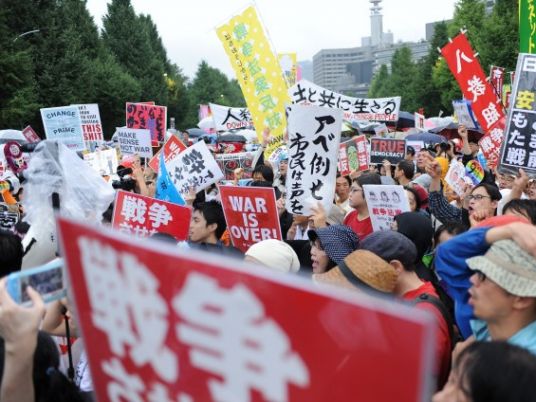
The largest protest demonstrations in more than 50 years have taken place throughout Japan.
Tens of thousands of protestors filled the square in front of the national Diet (parliament) Sunday, although crowd estimates differed from 30,000 (police estimate) to 120,000 (protestors’ claims).
They were opposing a series of security bills currently before parliament and what they perceive as a general drift towards militarization by the administration of Prime Minister Shinzo Abe.
The protestors carried signs that read, “War is Over”; “No War Legislation” among others.
As if to underscore the point, the Ministry of Defense on Monday released figures on the Fiscal Year 2016’ $42 billion defense budget request, a 2.2 percent rise in military spending over last year.
This would be the fourth rise in military spending since Abe and his Liberal Democratic Party (LDP) took control of the government in 2012. It is still below the informal rule that military spending not exceed 1 percent of GDP.
The unpopular “war legislation” is meant to implement the decision taken by the Abe cabinet in 2012 to re-interpret Japan’s pacifistic constitution to allow for – what’s called here – “collective defense.”
The term means to permit Japanese armed forces to come to the assistance of allied forces such as those of the United States and possibly other “close partners” such as the Philippines.
The protestors believe that the laws are unconstitutional under the current charter and could force Japan to take part in United States-led wars.
In his speech to the U.S. Congress last spring, Abe promised to have the necessary bills approved by parliament by the end of summer. They cleared the lower house and are now being considered in the upper house, which has until the end of September to act.
As this story has dragged out through the summer, Abe’s popularity ratings have steadily fallen. The last figure was 38 percent approval, his lowest in office, although still better than his recent predecessors.
However, Abe is still in a strong position. His term as LDP president, a prerequisite to being prime minister, ends Sept. 8, and it appears as of Wednesday that he will get another three-year term without opposition.
Final passage of the security bills in the wake of mounting public opposition may not be so certain. Abe’s government has a majority in the upper house but not the commanding majority that it has in the other body.
Abe has a safe card to play in the event the measures fail to pass. The lower house can override the weaker chamber with a two-thirds majority, which the LDP has with its Komeito coalition partner and possibly others.
He would be reluctant to use this rarely used provision, since he already being accused of “ramming” the bills through parliament.
Proponents of the security bills and the modest increase in defense spending say they reflect the changing security situation in Northeast Asia, recently underscored by a brief artillery duel between the two Koreas.
It might be underscored even more this week when China celebrates the 70th anniversary of the Japanese surrender in what is being billed as the largest demonstration of Chinese military might since the revolution.
Defense spending increases are necessary in the wake of ten years of declining expenditures by both Democratic and LDP administrations, the government says. Included are funds to station troops on Japan’s exposed southern islands, near the disputed Senkaku Islands – known as the Diaoyu Islands in China
But Beijing has lowered the temperature in the East China Sea standoff. There have been no major provocations since the establishment Nov. 2013 of the Air Defense Identification Zone over Senkaku, although Chinese coast guard vessels routinely enter Japanese territorial waters.
All sides agree that Abe has been a poor salesman for the security bills, which is one reason why many of the protestors are beginning to feel confident they can block them. His brief forays into public relations, such as using paper models to illustrate points, have been mocked.
But the anti-war public in Japan has other reasons to distrust Abe on this matter. He is, after all, the one who created a fully fledged defense ministry during his first term as premier, and also created a national security council, ended the prohibition on selling armaments abroad and increased defense expenditures.
Moreover, it is well known that he would scrap the anti-war clause in the Japanese constitution if he had the votes to do it.
According to long-time Japan observer Richard Katz, people cannot help conflating the message with the messenger – they fear a slippery slope.
The main problem is the convergence of a difficult-to-explain security need and a premier who is not fully trusted on this issue since he harbors revisionist views on history of the war.
The situation is beginning to look eerily like the massed demonstrations in 1960 against signing the U.S.-Japan Security Treaty that, among other things, caused former President Dwight Eisenhower to cancel a planned trip to Japan. And forced prime minister Nobusuke Kishi (Abe’s grandfather) to resign.
The demonstrators this year are made up in part by elderly people who remember the war or the war’s immediate aftermath and don’t want it to happen again, and increasing numbers of young people.
Young Japanese, long thought to be politically apathetic, are getting more and more comfortable in taking to the streets, not just against the security bills but also against the return of nuclear power plants.
They operate under the umbrella of the Students Emergency Actions for Liberal Democracy (SEALDS), which claims it stands for respecting the constitution and peaceful security policies.
SEALDS is planning more demonstrations.
They are also looking forward to the scheduled upper house elections in July when the voting age lowers from 20 to 18. Numerous upper house members, worried about keeping their seats, may be taking heed.
